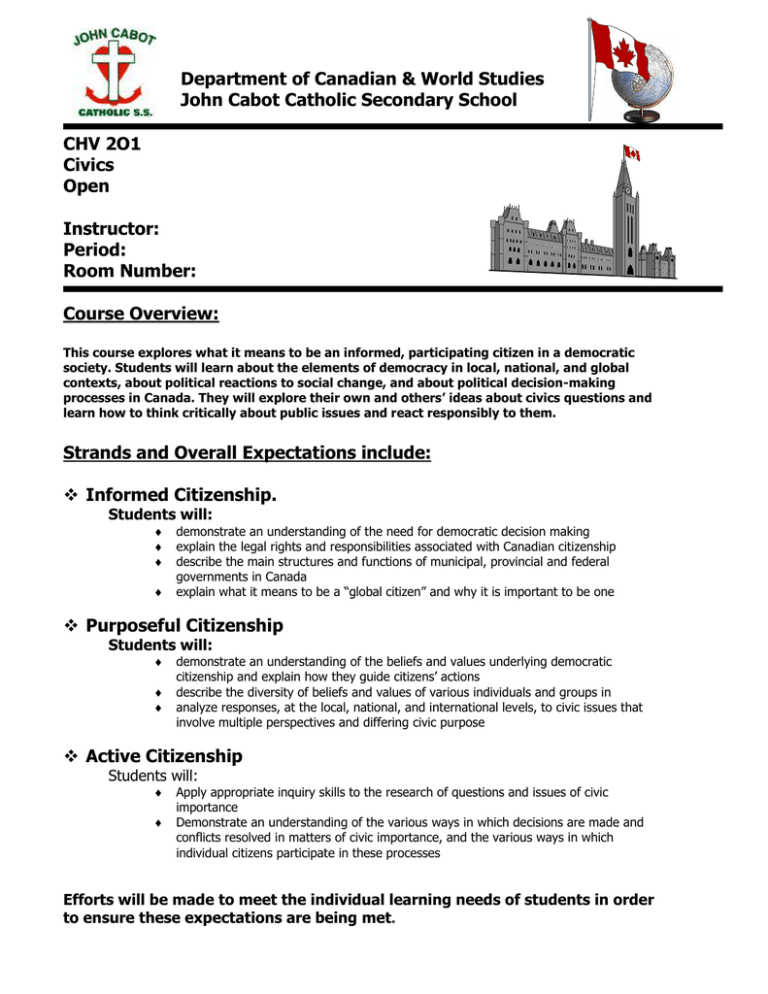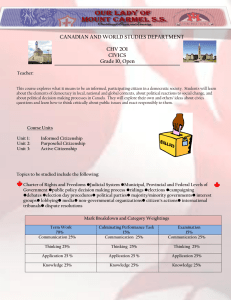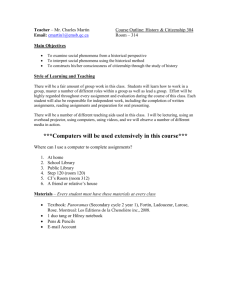Department of Canadian & World Studies John Cabot Catholic Secondary School
advertisement

Department of Canadian & World Studies John Cabot Catholic Secondary School CHV 2O1 Civics Open Instructor: Period: Room Number: Course Overview: This course explores what it means to be an informed, participating citizen in a democratic society. Students will learn about the elements of democracy in local, national, and global contexts, about political reactions to social change, and about political decision-making processes in Canada. They will explore their own and others’ ideas about civics questions and learn how to think critically about public issues and react responsibly to them. Strands and Overall Expectations include: Informed Citizenship. Students will: demonstrate an understanding of the need for democratic decision making explain the legal rights and responsibilities associated with Canadian citizenship describe the main structures and functions of municipal, provincial and federal governments in Canada explain what it means to be a “global citizen” and why it is important to be one Purposeful Citizenship Students will: demonstrate an understanding of the beliefs and values underlying democratic citizenship and explain how they guide citizens’ actions describe the diversity of beliefs and values of various individuals and groups in analyze responses, at the local, national, and international levels, to civic issues that involve multiple perspectives and differing civic purpose Active Citizenship Students will: Apply appropriate inquiry skills to the research of questions and issues of civic importance Demonstrate an understanding of the various ways in which decisions are made and conflicts resolved in matters of civic importance, and the various ways in which individual citizens participate in these processes Efforts will be made to meet the individual learning needs of students in order to ensure these expectations are being met. Course Breakdown Resources: Unit One: Government Systems Communities & Individuals Democratic Government Unit Two: Canada’s Government Canada’s Constitution Structures of Canada’s Government Local Governments The Judicial System Unit Three: Global Citizenship Being a Global Citizen Human Rights The course will use a variety of resources including video, CD-ROM, the Internet and a variety of print sources. The textbook Citizenship: Issues & Action will be distributed to students. The text and all other resources assigned to students are the responsibility of the student. Any damage incurred will result in payment for replacement. The replacement cost is $50.00. Mark Breakdown: Marks will be recorded according to the following competencies: Knowledge/ Understanding 25% Thinking 25% Communication 25% Application 25% Furthermore, evaluation is divided as: Term Work 70% Final (Exam & Culminating Activity) 30% Assessment & Evaluation Policy Students will be assessed & evaluated according to the work produced & skills displayed. Methods of providing feedback will include assessing work in process & evaluating completed assignments, tests, co-operative learning activities, simulations and presentations. Peer & self-assessments will also be utilized. Student marks will be determined by evaluating product according to 4 categories & 4 levels. Please see the chart below for specific skills and key words used to determine student competency in the different categories. Level Category Knowledge/Understanding Knowledge of content Understanding of content Thinking Critical/creative thinking skills Planning Skills Processing Skills Communication Level 1: 50-59% Level 2: 60-69% Level 3: 70-79% Level 4: 80-100% demonstrates/ expresses knowledge and skills with limited effectiveness demonstrates/ expresses knowledge and skills with some effectiveness demonstrates/ expresses knowledge and skills with considerable effectiveness demonstrates /expresses knowledge and skills with thorough effectiveness Expression and organization of ideas and information (oral, written & visual) Communication for different audiences/purposes Use of conventions of form, vocabulary & terminology Application Application of knowledge/skills in familiar contexts Transfer of knowledge/skills to new contexts Making connections within and between various contexts Feedback will also be provided for student learning skills. Skills like working independently, team work, organization, work habits and homework, and initiative are assessed independently student achievement and will be conducted through the use of a rubric indicating specific criteria to be achieved to receive each of the following letter grades: E –Excellent G – Good S – Satisfactory N - Needs Improvement Other Evaluation Issues LATE ASSIGNMENTS. Assignments submitted after the Primary Due Date established by the teacher will be accepted with a penalty of 5% off for the first day late and 2% for subsequent days to a maximum of 10%. This four day Penalty Zone is the maximum time allowed for submissions. The fourth day after the assignment is due is considered the Closure Date upon which no further assignments will be accepted. If the teacher returns the marked assignments within the four day penalty zone, the date of return is considered the closure date. Repeated lateness in submissions indicates poor organization skills and will result in parental contact and will be reflected in the learning skills section of the report card. INCOMPLETE ASSSIGNMENTS Assignments will be graded according to the extent with which they meet the criteria established MISSED TESTS Tests missed with a legitimate reason will be written within a few days of the student returning from the absence. Student eligibility to write the test and the date of writing will be at the discretion of the teacher in consultation with the department head. CULMINATING ACTIVITIES These activities will be due toward the end of the course. They are valued between 5 and 15 per cent of the final mark and will reflect course material and competencies not otherwise emphasized on the final exam. PLAGARISM in any form reflects academic dishonesty and may result in a mark of zero for the assignment in question




